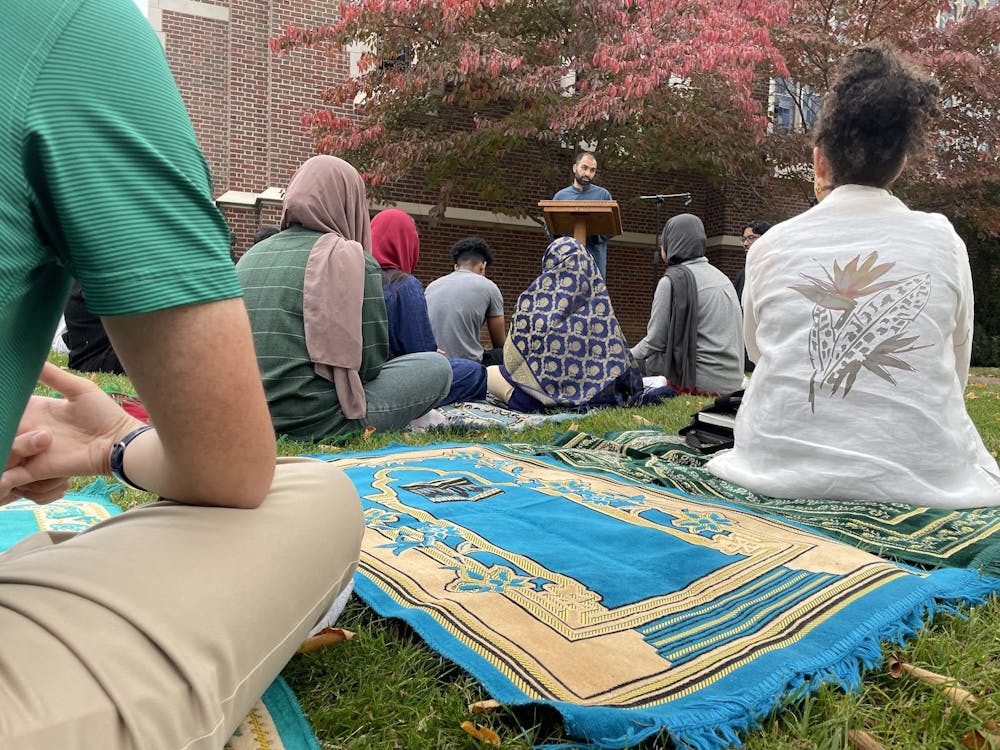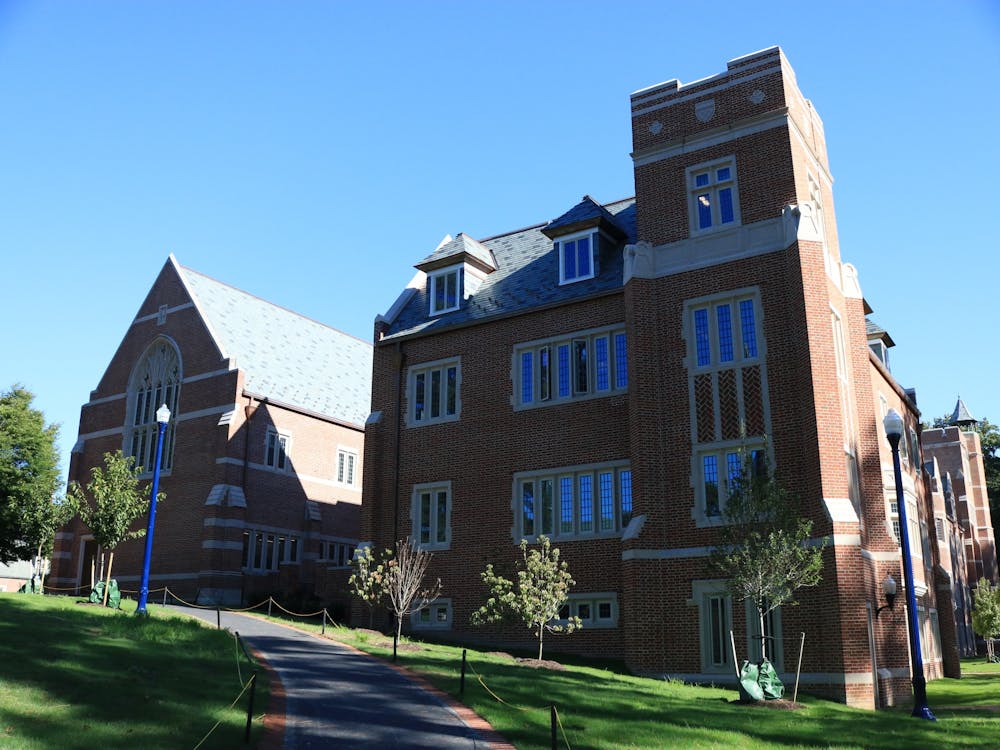Editor’s note: This article has been edited from its original copy to protect the identity of a student.
Roughly 50 students, faculty and staff from different faiths gathered on Friday, Oct. 27 in front of Cannon Memorial Chapel to support the University of Richmond’s Muslim community in prayer and to honor the Palestinian lives lost in the past weeks because of the Israel-Hamas conflict.
“The message we wanted to give today was that this was a welcoming space for everyone regardless of what faith you belong to,” a Muslim first-year student said.
This service came in the aftermath of angry tensions that flared up in the University Forum when a pro-Palestine protest organized by Spiders Against Apartheid was met with counter-protestors who held an Israeli and an Israel Defense Forces flag.
These recent conflicts have led to tensions on many college campuses across the United States, with UR, Virginia Commonwealth University and the University of Virginia experiencing tense protests in the last week.
Friday’s memorial at UR was a break from the intense encounters of earlier demonstrations. Students of Muslim, Jewish, Christian and other faiths listened quietly and politely to the testimonies and prayers of Muslim students on campus.
The service was divided into two parts; the first half allowed Muslim students to talk to the crowd about what they felt on campus in the last week.
Junior Ifti Alam spoke about how the anger and vitriol from both sides caused him to turn to his Muslim faith for guidance.
“God has blessed me that I have not physically encountered a war, so I haven't had to learn about it, nor think about it," Alam said. “I would like to stay ignorant about war and the rules of war. I've never felt the urge to learn what Islam says about war. However, in reflecting over the past few weeks, I've had to. And here are things that I reflect on: God's beautiful creation, the Earth, is being destroyed. Islam teaches us not to cut down even a tree for the sake of war.”
Alam went on to explain his frustrations with the campus response to the events that affect the Muslim community. He said those frustrations started before Hamas crossed the border into Israel to massacre civilians and should have been recognized by UR.
He was particularly frustrated with UR’s lack of response to the killing of 25-year-old Amir Abu Khadijeh, a Palestinian man, during a raid in Gaza on March 23, the first day of the holy month of Ramadan, according to Reuters.
“I also ask, where was the outcry when Muslims were crying and praying for those attacked and killed during the holy month of Ramadan last year?” Alam said. “When I read the news about the violence breaking in Palestine last year, I was in the dining hall getting ready for my meal kit to begin fasting the next day.”Alam was referring to the historical name of the region.
Enjoy what you're reading?
Signup for our newsletter
A first-year student reflected on the isolation she had felt as a Muslim student on UR’s campus in the past few weeks and said that she felt as if she had been forgotten about.
“I have been feeling disconnected from my peers, and I can't seem to continue with my life as normal because my mind is occupied with the tragic suffering of my Muslim community,” the first-year student said.
President Kevin Hallock released a statement on Oct. 11 which called for compassionate dialogue and identified resources students could use to access help, including Counseling and Psychological Services and the Office of the Chaplaincy. Vice President for Student Development Steve Bisese, Executive Vice President and Provost Joan Saab and Chief Human Resources Officer Geraldine Sullivan also sent a statement after the protest on Oct. 25, which reminded students that peaceful and respectful conversations was how to find change.
The first-year student called the response from UR lacking, and felt as if her community was left out of the conversation
“I'm disappointed that my voice and the voices of my brothers and sisters seem to not matter to the larger community. Do they not deserve the right to grieve? Do I not have the right to grieve?” the student said. “In my classes, I'm glad that my professors are extending their sympathies towards my Jewish friends. That's important. That's incredibly important, However, at the same time, I have to ask why are these same professors not extending sympathies towards me?”
The second half of Friday’s vigil consisted of two ritual prayers, the Janāzah and the duā, which are commonly done at funerals to honor the deceased. Students from all religions sat and prayed with the Muslim students to reflect and give their sympathies to the lives that have been lost in the past weeks.
Muslim Chaplain Waleed Ilyas said that interfaith support is crucial to all students who are struggling right now.
“The best way to describe the scene today is supportive,” Ilyas said. “When you look and see the diversity, I think that’s important. I just sense support, and that was one of the purposes of the program today, and I’m glad that's what we got out of it.”
About 15 students from Jewish Life and their Chaplain, Josh Jeffreys, came to the event to show their respect for the Muslim community at UR. They pushed the timing of their own service, Shabbat, which is usually held at the same time to attend the vigil.
“It's been a hard time, and all I can do is be there for other people,” a member affiliated with Jewish Life said, who asked to remain anonymous after Jewish students at UR received anti-semitic threats. “I can't control anything or take away their suffering, but I can say that I am here morally, and I stand with my brothers and sisters.”
University Chaplain Craig Kocher also attended the service, and saw it as a reminder of UR’s ability to come together during tough times, he said.
“I think it's really good that we can all experience the world differently and have various opinions on things and still listen to each other's stories,” Kocher said.
Ilyas said he hopes UR will grow and have more of these kinds of supportive dialogues.
“I'd love to see continued conversations,” Ilyas said. “You know, the purpose here was just to listen to each other. But sometimes we need to make everybody quiet in a program like this so that we can say something”
Contact news writer Andrea Padilla at andrea.padilla@richmond.edu.
Support independent student media
You can make a tax-deductible donation by clicking the button below, which takes you to our secure PayPal account. The page is set up to receive contributions in whatever amount you designate. We look forward to using the money we raise to further our mission of providing honest and accurate information to students, faculty, staff, alumni and others in the general public.
Donate Now



